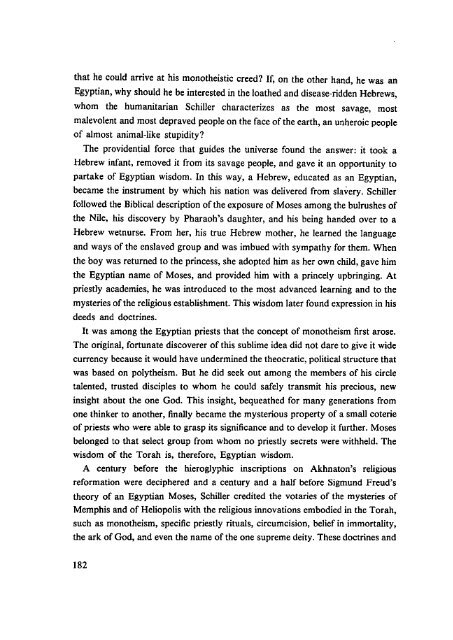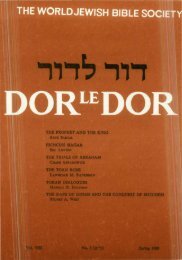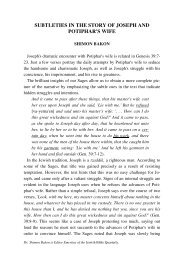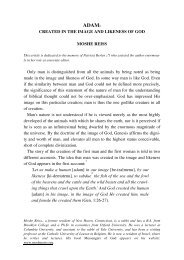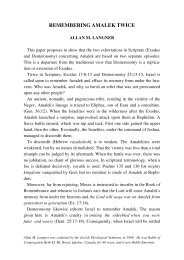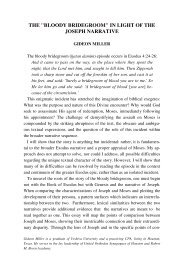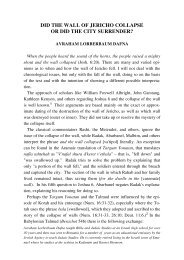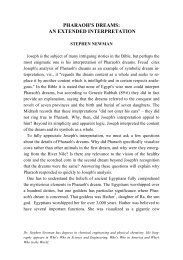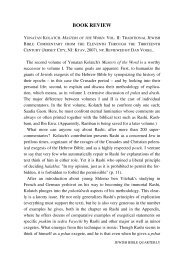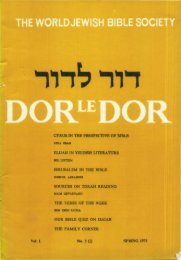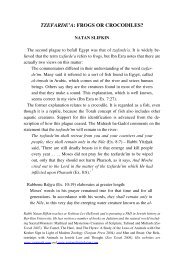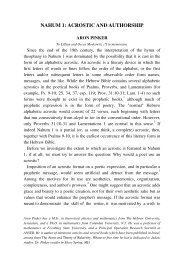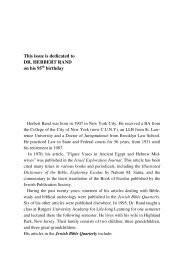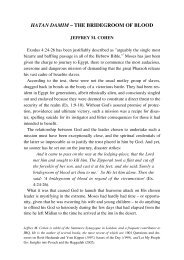The Development of Biblical Prayer - Jewish Bible Quarterly
The Development of Biblical Prayer - Jewish Bible Quarterly
The Development of Biblical Prayer - Jewish Bible Quarterly
Create successful ePaper yourself
Turn your PDF publications into a flip-book with our unique Google optimized e-Paper software.
that he could arrive at his monotheistic creed? If, on the other hand, he was an<br />
Egyptian, why should he be interested in the loathed and disease-ridden Hebrews,<br />
whom the humanitarian Schiller characterizes as the most savage, most<br />
malevolent and most depraved people on the face <strong>of</strong> the earth, an unheroic people<br />
<strong>of</strong> almost animal-like stupidity?<br />
<strong>The</strong> providential force that guides the universe found the answer: it took a<br />
Hebrew infant, removed it from its savage people, and gave it an opportunity to<br />
partake <strong>of</strong> Egyptian wisdom. In this way, a Hebrew, educated as an Egyptian,<br />
became the instrument by which his nation was delivered from slavery. Schiller<br />
followed the <strong>Biblical</strong> description <strong>of</strong> the exposure <strong>of</strong> Moses among the bulrushes <strong>of</strong><br />
the Nile, his discovery by Pharaoh's daughter, and his being handed over to a<br />
Hebrew wetnurse. From her, his true Hebrew mother, he learned the language<br />
and ways <strong>of</strong> the enslaved group and was imbued with sympathy for them. When<br />
the boy was returned to the princess, she adopted him as her own child, gave him<br />
the Egyptian name <strong>of</strong> Moses, and provided him with a princely upbringing. At<br />
priestly academies, he was introduced to the most advanced learning and to the<br />
mysteries <strong>of</strong> the religious establishment. This wisdom later found expression in his<br />
deeds and doctrines.<br />
It was among the Egyptian priests that the concept <strong>of</strong> monotheism first arose.<br />
<strong>The</strong> original, fortunate discoverer <strong>of</strong> this sublime idea did not dare to give it wide<br />
currency because it would have undermined the theocratic, political structure that<br />
was based on polytheism. But he did seek out among the members <strong>of</strong> his circle<br />
talented, trusted disciples to whom he could safely transmit his precious, new<br />
insight about the one God. This insight, bequeathed for many generations from<br />
one thinker to another, finally became the mysterious property <strong>of</strong> a small coterie<br />
<strong>of</strong> priests who were able to grasp its significance and to develop it further. Moses<br />
belonged to that select group from whom no priestly secrets were withheld. <strong>The</strong><br />
wisdom <strong>of</strong> the Torah is, therefore, Egyptian wisdom.<br />
A century before the hieroglyphic inscriptions on Akhnaton's religious<br />
reformation were deciphered and a century and a half before Sigmund Freud's<br />
theory <strong>of</strong> an Egyptian Moses, Schiller credited the votaries <strong>of</strong> the mysteries <strong>of</strong><br />
Memphis and <strong>of</strong> Heliopolis with the religious innovations embodied in the Torah,<br />
such as monotheism, specific priestly rituals, circumcision, belief in immortality,<br />
the ark <strong>of</strong> God, and even the name <strong>of</strong> the one supreme deity. <strong>The</strong>se doctrines and<br />
182


